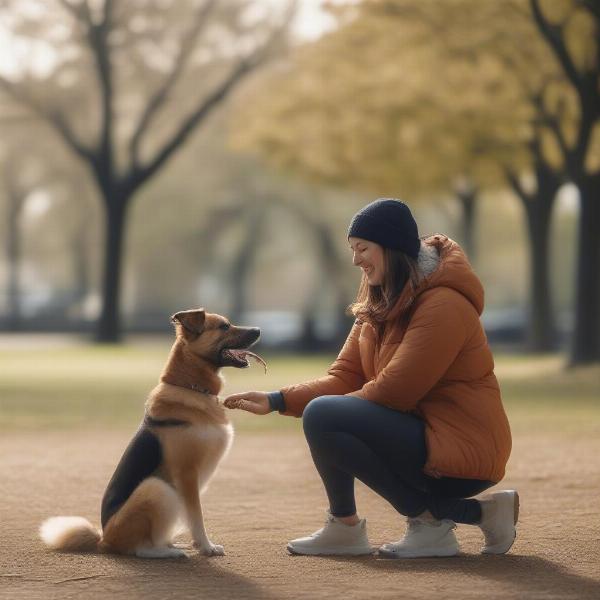The question of whether a dog tasting blood will make it more aggressive and likely to attack again is a common concern among dog owners. While the idea of a dog becoming a “bloodthirsty” predator after tasting blood might seem alarming, the reality is far more nuanced. This article will delve into the science behind this concern, explore the factors influencing a dog’s behavior after encountering blood, and provide practical advice for dog owners.
Understanding a Dog’s Reaction to Blood
Dogs, like many predators, are instinctively drawn to the smell and taste of blood. This doesn’t necessarily mean they’ll become aggressive. The scent of blood can trigger a dog’s prey drive, leading them to investigate the source. However, this investigation is typically driven by curiosity rather than a desire to attack.
Factors Influencing Aggression
Several factors influence whether a dog might display aggression after encountering blood:
- Prior Experiences: A dog with a history of aggression or fear-based biting is more likely to react negatively in situations involving blood, regardless of whether it has tasted it.
- Individual Temperament: Some dogs are naturally more prone to aggression than others, due to genetics and early socialization.
- The Source of the Blood: If the blood belongs to another animal, the dog’s prey drive might be triggered, increasing the likelihood of chasing or attacking the injured animal. If the blood is the dog’s own, it might experience pain or fear, potentially leading to defensive aggression.
- The Dog’s Training and Socialization: Well-trained and socialized dogs are generally less likely to display aggression in any situation, including those involving blood.
What to Do if Your Dog Tastes Blood
- Remain Calm: Your dog can sense your anxiety. Staying calm will help reassure them.
- Assess the Situation: Determine the source of the blood and remove your dog from the situation if necessary.
- Clean the Area: Thoroughly clean any blood spills to eliminate the scent and prevent your dog from revisiting the area.
- Monitor Your Dog’s Behavior: Observe your dog for any changes in behavior, such as increased aggression, anxiety, or fear.
- Consult a Veterinarian or Professional Dog Trainer: If you’re concerned about your dog’s behavior after encountering blood, seek professional guidance.
Preventing Future Incidents
- Socialization: Early and ongoing socialization is crucial for developing a well-adjusted dog. Expose your dog to various sights, sounds, smells, and experiences to help them become comfortable in different situations.
- Training: Obedience training is essential for teaching your dog basic commands and impulse control. This can help prevent aggressive behaviors.
- Management: Be mindful of your dog’s triggers and manage their environment to minimize the likelihood of encountering situations that might provoke aggression.
 A dog owner training their dog with treats
A dog owner training their dog with treats
Conclusion
While the taste of blood can trigger a dog’s natural instincts, it doesn’t automatically transform them into aggressive attackers. A dog’s behavior is influenced by a complex interplay of factors, including prior experiences, temperament, training, and the specific circumstances surrounding the encounter with blood. By understanding these factors and taking proactive steps, dog owners can help ensure their dogs remain safe and well-behaved.
FAQ
- My dog licked a small cut on my hand. Should I be worried? No, a single lick of blood is unlikely to cause any significant behavioral changes.
- My dog got into a fight with another dog and tasted blood. Will it be more aggressive now? It’s possible the experience could increase its aggression, especially if the dog already had aggression issues. Consult a professional trainer for guidance.
- Is there a way to desensitize my dog to the smell of blood? Yes, a professional trainer can help you desensitize your dog to various stimuli, including the smell of blood.
- My dog keeps licking its own wounds. Is this normal? Licking wounds is a natural instinct, but excessive licking can hinder healing. Consult a veterinarian.
- How can I prevent my dog from encountering blood in the first place? Supervise your dog closely, especially in areas where other animals might be present. Clean up any blood spills promptly.
About ILM Dog
ILM Dog is your trusted international resource for expert dog care advice, covering everything from breed selection and puppy care to senior dog health, training, nutrition, and even traveling with your furry friend. We offer practical, reliable information to empower dog owners worldwide. For personalized guidance on dog behavior and training, contact us at [email protected] or call us at +44 20-3965-8624. Visit ILM Dog for more helpful resources.